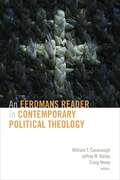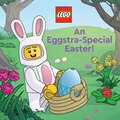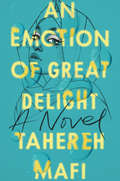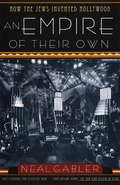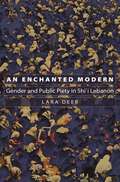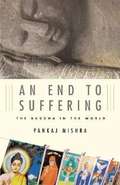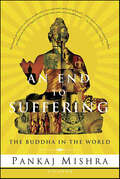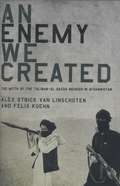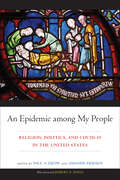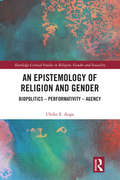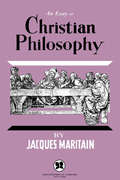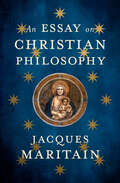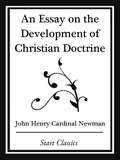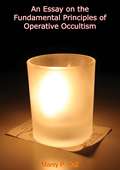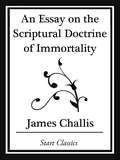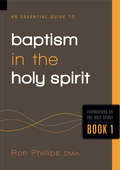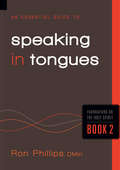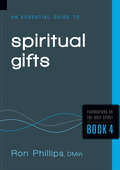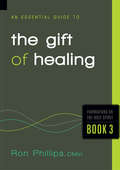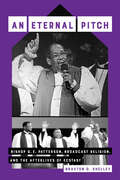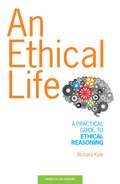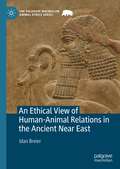- Table View
- List View
An Eerdmans Reader in Contemporary Political Theology
by Craig Hovey Jeffrey Bailey William T. CavanaughAn Eerdmans Reader in Contemporary Political Theology gathers some of the most significant and influential writings in political theology from the twentieth and twenty-first centuries. Given that the locus of Christianity is undeniably shifting to the global South, this volume uniquely integrates key voices from Africa, Asia, and Latin America with central texts from Europe and North America on such major subjects as church and state, gender and race, and Christendom and postcolonialism.Carefully selected, thematically arranged, and expertly introduced, these forty-nine essential readings constitute an ideal primary-source introduction to contemporary political theology — a profoundly relevant resource for globally engaged citizens, students, and scholars.CONTRIBUTORS:Nicholas AdamsRafael AvilaKarl BarthRichard BauckhamDietrich BonhoefferWalter BrueggemannErnesto CardenalJ. Kameron CarterJames H. ConeDorothy DayMusa W. Dube Jean Bethke ElshtainEric GregoryGustavo GutiérrezStanley HauerwasGeorge HunsingerAda María Isasi-DiazEmmanuel M. KatongoleRafiq KhouryKosuke KoyamaBrian McDonaldJohann Baptist Metzv Virgil MichelNéstor O. MiguezJohn MilbankJohn Courtney MurrayChed MyersH. Richard NiebuhrReinhold NiebuhrArvind P. NirmalOliver O’DonovanCatherine PickstockKwok Pui-lanA. Maria Arul RajaWalter RauschenbuschJoerg RiegerChristopher RowlandRosemary Radford RuetherAlexander SchmemannCarl SchmittPeter Manley ScottJon SobrinoDorothee SolleR. S. SugirtharajahElsa TamezMark Lewis TaylorEmilie M. TownesDesmond TutuBernd WannenwetschGraham WardGeorge WeigelDelores S. WilliamsRowan WilliamsWalter WinkJohn Howard YoderKim Yong-Bock
An Egg-cellent Easter! (Barbie)
by Kellee Riley Rebecca FrazerBarbie and her sisters celebrate Easter with a fabulous Easter parade! Featuring over 50 glitter stickers, girls 3-7 will love to find this eggstra-special,full-color 8 x 8 storybook in their Easter basket!From the Trade Paperback edition.
An Eggstra-Special Easter! (LEGO Iconic)
by Matt HuntleyA delightful Easter storybook starring LEGO® minifigures! Duncan&’s favorite day is Easter, and his dreams come true when the Easter Bunny needs his help delivering eggs. But it&’s a big responsibility and he&’s not sure he can do it. Will a little confidence and some LEGO® creativity get the job done? This sweet and silly storybook is the perfect gift for LEGO fans ages 4 to 7 on Easter or any day! LEGO, the LEGO logo, the Brick and Knob configurations, and the Minifigure are trademarks and/or copyrights of the LEGO Group. ©2021 The LEGO Group. All rights reserved.
An Emotion of Great Delight
by Tahereh MafiFrom bestselling and National Book Award–nominated author Tahereh Mafi comes a stunning novel about love and loneliness, navigating the hyphen of dual identity, and reclaiming your right to joy—even when you’re trapped in the amber of sorrow. It’s 2003, several months since the US officially declared war on Iraq, and the American political world has evolved. Tensions are high, hate crimes are on the rise, FBI agents are infiltrating local mosques, and the Muslim community is harassed and targeted more than ever. Shadi, who wears hijab, keeps her head down. She's too busy drowning in her own troubles to find the time to deal with bigots. Shadi is named for joy, but she’s haunted by sorrow. Her brother is dead, her father is dying, her mother is falling apart, and her best friend has mysteriously dropped out of her life. And then, of course, there’s the small matter of her heart— It’s broken. Shadi tries to navigate her crumbling world by soldiering through, saying nothing. She devours her own pain, each day retreating farther and farther inside herself until finally, one day, everything changes. She explodes. An Emotion of Great Delight is a searing look into the world of a single Muslim family in the wake of 9/11. It’s about a child of immigrants forging a blurry identity, falling in love, and finding hope—in the midst of a modern war.
An Empire of Their Own: How the Jews Invented Hollywood
by Neal GablerA provocative, original, and richly entertaining group biography of the Jewish immigrants who were the moving forces behind the creation of America's motion picture industry. The names Harry Cohn, William Fox, Carl Laemmle, Louis B. Mayer, Jack and Harry Warner, and Adolph Zucker are giants in the history of contemporary Hollywood, outsiders who dared to invent their own vision of the American Dream. Even to this day, the American values defined largely by the movies of these émigrés endure in American cinema and culture. Who these men were, how they came to dominate Hollywood, and what they gained and lost in the process is the exhilarating story of An Empire of Their Own.
An Enchanted Modern: Gender and Public Piety in Shi'i Lebanon (Princeton Studies in Muslim Politics #17)
by Lara DeebBased on two years of ethnographic research in the southern suburbs of Beirut, An Enchanted Modern demonstrates that Islam and modernity are not merely compatible, but actually go hand-in-hand. This eloquent ethnographic portrayal of an Islamic community articulates how an alternative modernity, and specifically an enchanted modernity, may be constructed by Shi'I Muslims who consider themselves simultaneously deeply modern, cosmopolitan, and pious. In this depiction of a Shi'I Muslim community in Beirut, Deeb examines the ways that individual and collective expressions and understandings of piety have been debated, contested, and reformulated. Women take center stage in this process, a result of their visibility both within the community, and in relation to Western ideas that link the status of women to modernity. By emphasizing the ways notions of modernity and piety are lived, debated, and shaped by "everyday Islamists," this book underscores the inseparability of piety and politics in the lives of pious Muslims.
An End to Suffering: The Buddha in the World
by Pankaj MishraAn End to Suffering is a deeply original and provocative book about the Buddha's life and his influence throughout history, told in the form of the author's search to understand the Buddha's relevance in a world where class oppression and religious violence are rife, and where poverty and terrorism cast a long, constant shadow. Mishra describes his restless journeys into India, Pakistan, and Afghanistan, among Islamists and the emerging Hindu middle class, looking for this most enigmatic of religious figures, exploring the myths and places of the Buddha's life, and discussing Western explorers' "discovery" of Buddhism in the nineteenth century. He also considers the impact of Buddhist ideas on such modern politicians as Gandhi and Nelson Mandela. As he reflects on his travels and on his own past, Mishra shows how the Buddha wrestled with problems of personal identity, alienation, and suffering in his own, no less bewildering, times. In the process Mishra discovers the living meaning of the Buddha's teaching, in the world and for himself. The result is the most three-dimensional, convincing book on the Buddha that we have.
An End to Suffering: The Buddha in the World
by Pankaj MishraA searching, personal portrait of the Buddha and his enduring influence, East and West.Pankaj Mishra's An End to Suffering is a deeply original and provocative book about the Buddha's life and his influence throughout history, told in the form of the author's search to understand the Buddha's relevance in a world where class oppression and religious violence are rife, and where poverty and terrorism cast a long, constant shadow. Mishra describes his restless journeys into India, Pakistan, and Afghanistan, among Islamists and the emerging Hindu middle class, looking for this most enigmatic of religious figures, exploring the myths and places of the Buddha's life, and discussing Western explorers' "discovery" of Buddhism in the nineteenth century. He also considers the impact of Buddhist ideas on such modern politicians as Gandhi and Nelson Mandela.As he reflects on his travels and on his own past, Mishra shows how the Buddha wrestled with problems of personal identity, alienation, and suffering in his own, no less bewildering, times. In the process Mishra discovers the living meaning of the Buddha's teaching, in the world and for himself. The result is the most three-dimensional, convincing book on the Buddha that we have.
An Endless Christmas: A Novella
by Cynthia RuchtiAward-winning novelist's heartwarming story about family and love lost, found, and finally truly revealed at Christmas.
An Enemy We Created: The Myth Of The Taliban-al Qaeda Merger In Afghanistan
by Felix Kuehn Alex Strick van LinschotenTo this day the belief is widespread that the Taliban and al-Qaeda are in many respects synonymous, that their ideology and objectives are closely intertwined and that they have made common cause against the West for decades. Yet this view has hardly ever been scrutinized or testedempirically. This is all the more surprising given that the West's present entanglement in Afghanistan is commonly predicated on the need to defeat the Taliban in order to forestall further terrorist attacks worldwide. There is thus an urgent need to re-examine the known facts of the Taliban-alQaeda relationship and to tell the story of the Taliban's encounter with internationalist militant Islamism. In An Enemy We Created, Alex Strick van Linschoten and Felix Kuehn focus on the complexity of the relationship between the two groups and the individuals who established them. The book, which has already been cited prominently in The New Yorker, is the first to examine in detail the relationship from the Taliban's perspective based on Arabic, Dari and Pashtu sources, drawing on the authors many years of experience in southern Afghanistan, the Taliban s heartland. Theyalso interviewed Taliban decision-makers, field commanders and ordinary fighters while immersing themselves in Kandahar's society. The story of those individuals who were to become the key decision-makers, and the relationships among all those involved from the mid-1990s onward, reveal howfrequently the Taliban and al-Qaeda diverged rather than converged. An Enemy We Created concludes that there is room to engage the Taliban on two fundamental issues: renouncing al-Qaeda and guaranteeing that Afghanistan will not be a sanctuary for international terrorists. Yet the insurgency is changing, and it could soon be too late to find a political solution. The authors contend that certain aspects of the campaign in Afghanistan, especially night raids and attempts to fragment and decapitate the Taliban, are transforming the resistance, creating more opportunities for al-Qaeda and helping it to attain its objectives.
An Epidemic among My People: Religion, Politics, and COVID-19 in the United States (Religious Engagement in Democratic Politics)
by Paul A. Djupe and Amanda FriesenThe pandemic presented religion as a paradox: faith is often crucial for helping people weather life’s troubles and make difficult decisions, but how can religion continue to deliver these benefits and provide societal structure without social contact? The topical volume, An Epidemic among My People explains how the COVID-19 pandemic stress tested American religious communities and created a new politics of religion centered on public health. The editors and contributorsconsider how the virus and government policy affected religion in America. Chapters examine the link between the prosperity gospel and conspiracy theories, the increased purchase of firearms by evangelicals, the politics of challenging public health orders as religious freedom claims, and the reactions of Christian nationalists, racial groups, and female clergy to the pandemic (and pandemic politics). As sharp lines were drawn between people and their governments during this uncertain time, An Epidemic among My People provides a comprehensive portrait of religion in American public life.
An Epistemology of Religion and Gender: Biopolitics, Performativity and Agency (Routledge Critical Studies in Religion, Gender and Sexuality)
by Ulrike E. AugaThis book puts forward a new epistemological framework for a theory of religion and gender’s role in the public sphere. It provides a sophisticated understanding of gender and its relation to religion as a primarily performative category of knowledge production, rooting that understanding in case studies from around the world. Gender and religion are examined alongside biopolitics and the influence of capitalism, neoliberalism and empire. The book analyses the interdependence of religion, gender and new nationalisms in the Palestinian territories, South Africa and the USA, scrutinising the biopolitical interferences of nation states and dominant political and religious institutions. It then moves on to uncover counter-discourses and spaces of activism and agency in contexts such as East Germany and the Occupy Wall Street movement. Using gender, queer and trans theory in tandem with postcolonial and post-secular perspectives, readers are shown a more nuanced understanding of critical contemporary questions related to religion, gender and sexuality. This is a bold new take on religion, gender and public life. As such, it will be of keen interest to scholars of Religious Studies and Gender Studies, as well as those working on religion’s interaction with Politics, Sociology and Social Activism.
An Essay on Christian Philosophy
by Jacques MaritainThis original translation, by Edward H. Flannery, brings you one of Maritain's most eye-opening studies of Christianity. Although not his most famous work, Maritain's An Essay on Christian Philosophy provides readers with an in-depth analysis and careful philosophical approach to the study of theology and, at the time of original publication, was considered to be the definitive statement of the Thomistic position. Discover his theses for yourself as Maritain considers the nature of philosophy, morality, and their relations to Christianity with clarity and a scholarly attention to detail. Flannery provides English readers with a glossary of terms to bring further understanding to Maritain's original words. Jacques Maritain was a French Catholic philosopher and political thinker. He was born in Paris in 1882, where he spent most of his life. His father was a prominent lawyer and his mother the daughter of a statesman. He attended the Sorbonne to study philosophy and natural science, and after marrying, he and his wife converted to Catholicism. It was after this he became a well-known scholar of St. Thomas Aquinas and Thomistic philosophy. He published widely on philosophical and political thought, and by the 1930s, he was an established thinker in the Catholic community. After the outbreak of WWII, Maritain relocated to the United States, where he taught at Princeton University and Columbia University. Later in life, he and his wife returned to France, where he continued to write and study Catholic scholarship until his death in 1973.
An Essay on Christian Philosophy
by Jacques MaritainThis important essay by the French Catholic philosopher articulates the foundation for his influential interpretations of Thomas Aquinas. Known for his influential writings that brought fresh relevance to the work of Thomas Aquinas, Jacques Maritain was one of the most important Catholic philosophers of the twentieth century. Although An Essay on Christian Philosophy is not generally considered to be among his major works, it is, in a sense, the key to unlocking his massive synthesis of modern Thomism. This provocative essay reveals the inner springs of Maritain&’s ideas concerning mankind&’s relationship to God. This lucid translation by Edward H. Flannery includes a glossary of technical terms, making it even more accessible for the general reader.
An Essay on Morals: A Science of Philosophy and a Philosophy of the Sciences
by Philip WylieA Science of PHILOSOPHY and a Philosophy of the SCIENCES "a Popular Explanation of the Jungian THEORY of HUMAN INSTINCT "a new Bible for the BOLD MIND and a Way to Personal Peace by LOGIC "the HERETIC'S HANDBOOK and Text for HONEST skeptics, including a Description of MAN suitable for an ATOMIC AGE" together with a compendium of MEANS TO BROTHERHOOD in a Better World" and a VOYAGE beyond the Opposite Directions of Religion and Objective truth, to UNDERSTANDING" -Front Cover
An Essay on the Development Christian Doctrine (Start Classics)
by John Henry NewmanStill considered essential reading for serious thinkers on religion more than a century and a half after it was written, this seminal work of modern theology, first published in 1845, presents a history of Catholic doctrine from the days of the Apostles to the time of its writing, and follows with specific examples of how the doctrine has not only survived corruption but grown stronger through defending itself against it, and is, therefore, the true religion. This classic of Christian apologetics, considered a foundational work of 19th-century intellectualism on par with Darwin's Origin of Species, is must reading not only for the faithful but also for anyone who wishes to be well educated in the fundamentals of modern thought.
An Essay on the Fundamental Principles of Operative Occultism
by Manly P. HallFirst published in 1929, this is one of Canadian-born mystical writer Manly P. Hall’s essays on the art of self-realization, as expressed through the wisdom of the ages.An Essay on the Fundamental Principles of Operative Occultism provides an early description of the seven spinal chakras and the science of regeneration.Beautifully illustrated with three oil paintings by Mihran K. Serailian.
An Essay on the Scriptural Doctrine of Immortality (Start Classics)
by James ChallisBy immortality is ordinarily understood the doctrine that the human soul will survive death, continuing in the possession of an endless conscious existence. Together with the question of the existence of God, it forms the most momentous issue with which philosophy has to deal. It belongs primarily to rational or metaphysical psychology and the philosophy of religion, though it comes also into contact with other branches of philosophy and some of the natural sciences.
An Essential Guide to Baptism in the Holy Spirit (Foundations on the Holy Spirit #1)
by Ron PhillipsThis book is part of the Foundation Series by Pastor Ron Phillips. The series will contain books describing the basic foundational truths for the Spirit-filled believer. An Essential Guide to Baptism in the Holy Spirit describes the author&’s own experience of being baptized by the Holy Spirit. It will demonstrate how the power of the Holy Spirit in our lives today can help us to preach the good news, drive out devils, heal the sick, and see God&’s kingdom on the earth grow.
An Essential Guide to Speaking in Tongues (Foundations on the Holy Spirit #2)
by Ron PhillipsThis book is part of the Foundation Series by Pastor Ron Phillips. The series will contain books describing the basic foundational truths for the Spirit-filled believer. An Essential Guide to Speaking in Tongues will describe the author&’s own experience with speaking in tongues. The author brings great balance to this topic and helps readers to understand that speaking in tongues is a blessing of God that gives us the ability to boldly approach God&’s throne with the Holy Spirit&’s power and language.
An Essential Guide to Spiritual Gifts (Foundations on the Holy Spirit)
by Ron PhillipsWhat are spiritual gifts? What does the Bible say about them? How do I experience them for myself? In An Essential Guide to Spiritual Gifts, Ron Phillips explains the gifts of the Spirit--including the five leadership gifts, the seven service gifts, and the eight sign gifts--and provides clear biblical background and support for them. As a Spirit-filled Southern Baptist pastor, Phillips brings a welcome balance to the topic. Offering clear support from Scripture along with dynamic illustrations from his own life and the lives of others, he demonstrates the importance and operation of each of the gifts. The Holy Spirit who filled Jesus, empowered His ministry, raised Him from the dead, and performed miracles in the early church is the same Holy Spirit who equips believers today. Discover how you can activate these amazing gifts in your life.
An Essential Guide to the Gift of Healing (Foundations on the Holy Spirit)
by Ron PhillipsWhat does it mean to have the gift of healing? What does the Bible say about it? How do I experience it for myself? Many people have questions about how the Holy Spirit works in our lives. In An Essential Guide to the Gift of Healing, Ron Phillips explains the gift of healing and provides clear and comprehensive biblical background and support for the practice. As a Spirit-filled Southern Baptist pastor, Phillips brings a welcome balance to the topic, examining the many avenues that lead to healing and health. Filled with information and illustrations from his own life and the lives of others, this book clearly demonstrates God’s power to touch and heal lives even today. The Bible is filled with miraculous accounts of healing. The Holy Spirit who activated these miracles in the early church is the same Holy Spirit who equips believers today. This book will help you build your faith and appreciate God’s gift of healing, whatever form that healing might take.
An Eternal Pitch: Bishop G. E. Patterson, Broadcast Religion, and the Afterlives of Ecstasy (Phono: Black Music and the Global Imagination #2)
by Braxton D. ShelleyAn Eternal Pitch examines the homiletic life and afterlife of Bishop G. E. Patterson, the dynamic spiritual leader of the Church of God in Christ from 2000 to 2007. Although Patterson died in 2007, his voice remains a staple of radio and television broadcast, and his sermons have taken on a life of their own online, where myriad YouTube, Facebook, Instagram, and TikTok users enact innovative forms of religious broadcasting. Their preoccupation with Patterson’s "Afterliveness" punctuates the significance of Patterson’s preoccupation with musical repetition: across the decades of Patterson’s ministry, a set of musical gestures recur as sonic channels, bringing an individual sermon into contact with scripture’s eternal transmission.
An Ethical Life: A Practical Guide to Ethical Reasoning
by Richard KyteEthics isn't just a set of principles to study, but a skill to practice. By introducing a logical 4-Way Method, An Ethical Life demonstrates how everyone has the capability to work out complex and real ethical dilemmas.
An Ethical View of Human-Animal Relations in the Ancient Near East (The Palgrave Macmillan Animal Ethics Series)
by Idan BreierExploring the earliest literary evidence for human-animal relations, this volume presents and analyzes biblical and Mesopotamian (Sumerian, Assyrian, and Babylonian) sources from the third millennium BCE through to the consolidation of the biblical literature in the first millennium BCE. Key Features:Provides the first comprehensive study of these texts from an ethical perspective.Examines proverbs, popular aphorisms, myths, epic literature, wisdom literature, historiography, prophecy, and law codes.Applies methodology from current contemporary biblical and ancient Near Eastern scholarship and human-animal ethics, thereby raising new questions that lead to fresh insights.An Ethical View of Human Animal-Relations in the Ancient Near East is essential reading for scholars and graduate students of animal ethics, applied ethics and biblical studies.
